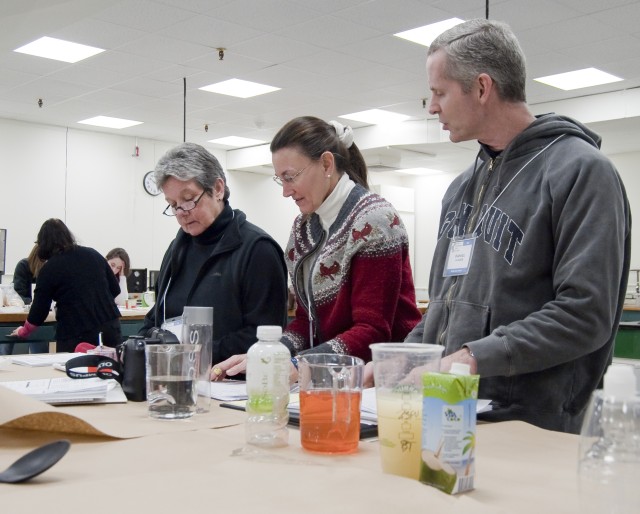Not every teacher heads to the beaches or ski slopes during school vacations.
Some prefer to spend that time huddled around tables in U.S. Army laboratories learning more about such subjects as nanotechnology and food packaging.
Twenty-six middle school and high school teachers from around Massachusetts did just that Feb. 22 to 24 at the U.S. Army Natick Soldier Research, Development and Engineering Center at Natick Soldier Systems Center. The Center for Advancement of STEM Education brought "Materials World Modules" teacher training to NSRDEC. Developed by Northwestern University, MWM gives teachers a "unique experience," according to Donna Bulger, NSRDEC workforce development manager.
"MWM offer hands-on learning experiences in science, technology, engineering and mathematics for middle and high school students," Bulger said. "Teachers (gain) inquiry and design skills while having the opportunity to work with NSRDEC mentors within NSRDEC's facility."
Teachers received stipends and optional graduate-level credits for attending the three-day sessions. Middle school teachers learned about food packaging, while high school teachers focused on nanotechnology.
"By incorporating everyday materials into science lessons," said Bulger, "the Materials World Modules (MWM) program ... has found the solution to getting students excited about learning science while helping teachers meet national and state education standards."
Funded by the National Defense Education Program, the CASE MWM program first came to NSRDEC in 2009.
"We spent a lot of time with the teachers, because you can't just give teachers materials without giving them some instruction on how to use it in the classroom," Bulger said. "They liked these modules because we include our STEM professionals as mentors. It really brings it to real world for the teachers."
That was confirmed by Stu Schultz, the nanotechnology module instructor.
"Right here at Natick, they've got people who are employed to design food packaging for the military, for the Soldiers in the field," Schultz told the teachers. "It's a real job. You're doing real-world stuff, but you're learning the ... science, technology, engineering and math in a real-world context."
When presented to them that way in the classroom, Schultz told the teachers, students become more engaged.
"All of a sudden, the kids realize that science class and math class (are) not something I'm just taking to ... get a grade," said Schultz, "but it really has application in the world that I live in."
Both Schultz and Bill Schmidt, the CASE instructor for the food packaging module, sprinkled anecdotes and humor into their sessions at Natick.
"They are so passionate about passing on passion for inquiry," said Bulger of the instructors. "The teachers love them. They're just so good at what they do."
Deb Roussell, a sixth- and seventh-grade science teacher at Fowler School in Maynard, Mass., called the training among the best she has attended in 30 years of teaching.
"I am excited to go back to school and share my experiences with my students and colleagues," Roussell said. "I hope I can demonstrate the excitement I felt while in the lab experimenting and testing our prototypes. It was electrifying. I want my students to feel that excitement when they are in my classroom, too."
Roussell said she came to appreciate what the work done at Natick means to men and women in uniform.
"I have former students, and currently a parent of one of my students, who are deployed overseas," Roussell said. "Being here at Natick ... has brought me closer to the bigger picture of what we can do to make them more comfortable and healthy while they serve our country.
"I want to also stress how well this program was run. Everyone went out of their way to help us and make us feel welcomed. I really felt like I was a part of a team, and working together helped us all feel successful."
"The class was a labor of love," said Sandy D'Amico, a seventh-grade science teacher at Hopedale Junior Senior High School in Hopedale, Mass. "The loving of science and helping others were definitely not a labor, but mutual joy in learning."
Dan McCook, who teaches seventh-grade science at the Whitcomb School in Marlborough, Mass., said he found the training beneficial.
"The course was organized, goals were clear, materials were readily available and the support staff went out of their way to facilitate the experience," McCook said. "Personally, I felt that the most valuable aspect of the training was the fact that we were able to put ourselves in our students' shoes."
Schmidt praised the teachers who attended the training sessions.
"I want to tell you, this is one super group of teachers," Schmidt said. "And part of the reason they're super is because they really make an effort to go out and continue to grow, find activities for the kids."
Every teacher should have access to this training, Schmidt said.
"If it did happen," said Schmidt, "what kids did to learn something in the classroom would change."
As Bulger pointed out, the modules took place at NSSC for the first time rather than at local high schools.
"It's just a different environment for them," said Bulger of the teachers. "And they love it."


Social Sharing